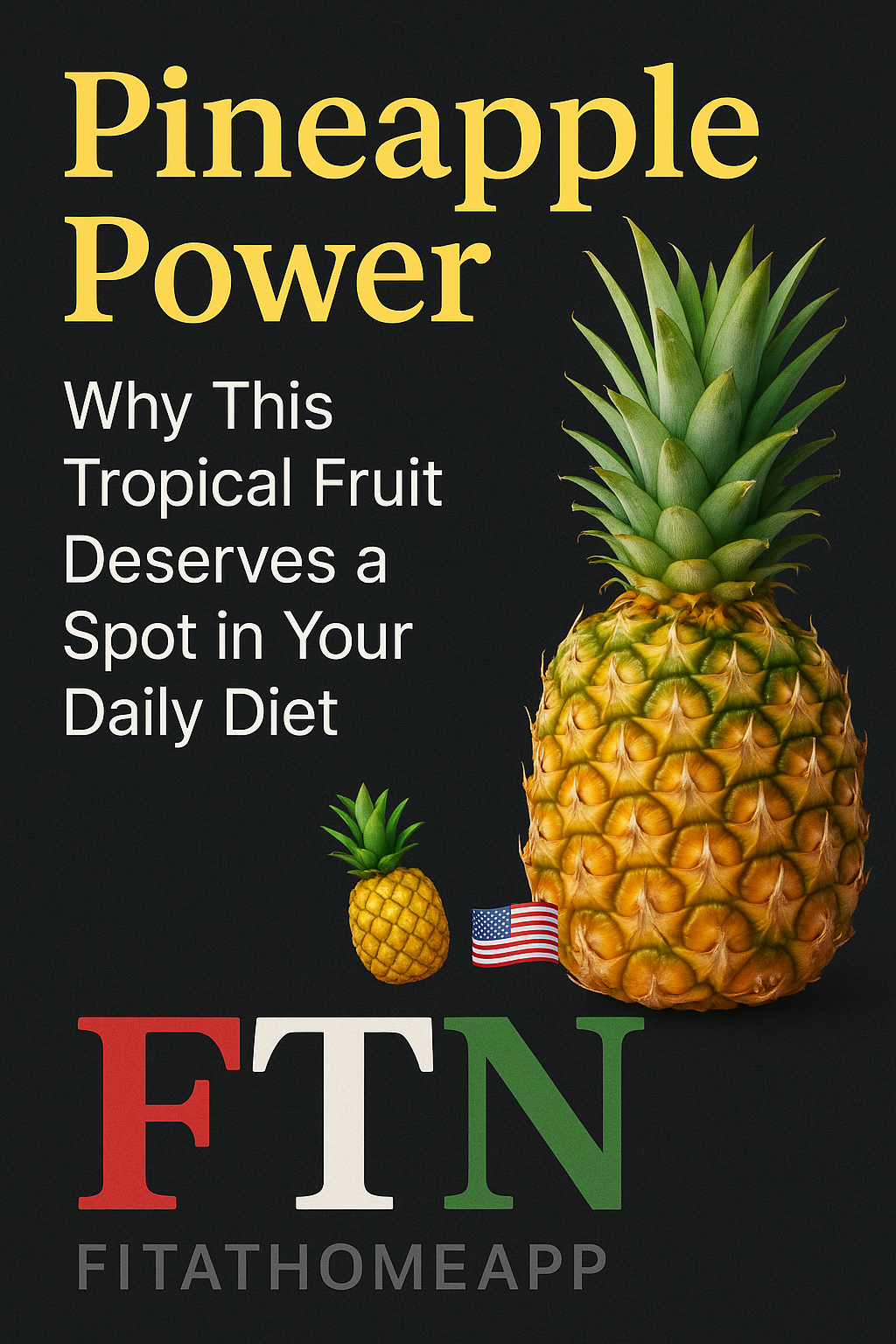Pineapple — that sweet, tangy tropical treat — is more than just a refreshing snack. Behind its golden yellow hue lies a powerhouse of essential nutrients, antioxidants, and unique enzymes designed to benefit your body and mind. Whether you’re an athlete, health-conscious parent, or culinary explorer, pineapple delivers on flavor and wellness. In this article, we’ll explore why pineapple deserves a permanent spot in your daily routine — and how to enjoy it safely and smartly.
https://www.medicalnewstoday.com/articles/324203
1. Nutrient Profile & Antioxidant Power
Pineapple is remarkably nutrient-dense for its low calorie count (~82 calories per cup). Each cup delivers nearly 88‑100% of your daily vitamin C, essential for immune defense, skin repair, and collagen production. It also supplies 50‑100% of your manganese needs, which supports bone health, metabolism, and antioxidant enzyme function.
In addition, pineapple contains B vitamins (B6, folate, thiamin), potassium, magnesium, copper, beta‑carotene, and fiber—providing a spectrum of macro and micronutrients. The phytochemical profile includes flavonoids and phenolic acids with antioxidant and anti-inflammatory potential.
https://www.verywellhealth.com/pineapple-carb-counts-health-benefits-1087567
2. Bromelain: The Unique Enzyme
Pineapple is the only common food source of bromelain, a proteolytic enzyme found mainly in its stem and core Studies on bromelain show it:
Improves protein digestion, reducing bloating and supporting nutrient absorpti
Reduces inflammation and pain, assisting in conditions like arthritis, sinusitis, and muscle soreness.
May help speed recovery after surgeries or workouts by breaking down inflammatory compounds.
Though bromelain supplements are beyond scope, regular pineapple consumption provides a natural dose of this enzyme. Note: fresh pineapple may cause mild tingling due to bromelain’s protein-breaking action — harmless and temporary.
3. Digestive & Gut Support
The combination of dietary fiber (~2–2.3g per cup) and bromelain makes pineapple a digestive aid. It helps maintain regular bowel movements, supports gut flora, and eases constipation or bloating.
Bromelain may reduce inflammation in the gut lining, potentially easing symptoms of inflammatory bowel conditions in early research stages. Pineapple water—pineapple chunks infused in hydration—has become a popular low-calorie drink for digestion support and metabolism boosting.
4. Immune, Heart & Eye Health
🔹 Immune Support
Vitamin C and beta‑carotene in pineapple combat oxidative stress and support white blood cell function, helping prevent infections and illnesses like colds and flu . A study shows children eating pineapple had higher immune cell counts and fewer infections.
🔹 Heart & Blood Pressure
Pineapple’s potassium, fiber, and antioxidants contribute to heart health by regulating blood pressure, lowering cholesterol, and reducing arterial plaque risk—creating a cardioprotective effect Animal studies show pineapple intake may lower lipid levels and oxidative stress in the heart.
🔹 Eye & Bone Health
Beta‑carotene and vitamin A help prevent age-related macular degeneration. Vitamin C and manganese support collagen production and bone strength—vital for aging populations
5. Weight Management & Metabolism
Pineapple is low in calories, high in water and fiber, and offers a natural, sweet flavor—making it an ideal snack alternative to processed sugary foods Bromelain and vitamin C may support fat metabolism and bloating reduction, contributing to weight loss when combined with exercise and balanced diet .
6. Pain Relief, Recovery & Skin Health
Due to its anti-inflammatory properties, bromelain helps relieve arthritis pain, sinus pressure, and post-exercise muscle soreness Including pineapple in post-workout smoothies may accelerate recovery and ease discomfort.
Vitamin C also promotes collagen synthesis, helping maintain skin elasticity and reduce aging effects—especially beneficial for sun-exposed ski
7. Usage Tips, Precautions & Creative Ideas
How to enjoy safely:
Choose ripe pineapple: it’s fragrant, firm, and free of soft spots.
If fresh pineapple causes stinging, soak in lightly salted water for a minute or grill it; heat deactivates bromelain.
Pair pineapple with protein or healthy fats when eating, especially if diabetic, to slow sugar absorption and minimize glycemic spikes.
Avoid overconsumption if allergic or on blood thinners; consult healthcare provider if necessary.
Creative ways to enjoy:
Fresh slices, grilled rings, or pineapple-infused water.
Smoothies with coconut milk, spinach, protein powder.
Pineapple salsa, slaws, marinades, or fruit bowls.
8. Global Appeal & Historical Context
Originally cultivated in South America over millennia, pineapple became a symbol of hospitality in colonial America and spread worldwide thanks to explorers like Columbus and trade networks. Today, it’s grown in tropical regions globally and enjoyed in cuisines from Hawaiian to Southeast Asian dishes. Its global popularity stems from its wide health and culinary versatility.
9. Limitations & What Research Still Needs
While preliminary evidence (especially from animals) suggests benefits in inflammation, cardiovascular health, and fat metabolism, more human clinical trials are needed to confirm these effects—especially regarding bromelain’s long-term impact. Side effects are rare but binge consumption may lead to mouth irritation or digestive discomfort. Individuals with allergies, pregnancy, or medication use should approach with caution.
✅ Conclusion
Pineapple is more than just a delicious tropical fruit—it’s a complete wellness package. Packed with vitamin C, manganese, fiber, bromelain, and antioxidants, it supports digestion, immunity, heart health, weight management, and skin vitality. With simple serving tips and creative recipe options, adding pineapple to your daily diet is effortless—and rewarding. So whether you juice it, grill it, or blend it, pineapple power deserves a permanent place in your healthy living routine.
🎥 Watch This Explained on YouTube
🧠 Key Benefits Highlighted in the Video
(Rephrased and structured to match your article’s tone and flow)
Pineapple Benefits for Athletes
Discover how pineapple, rich in bromelain, vitamin C, electrolytes, and simple sugars, can support digestion, muscle recovery, and hydration for athletes.
🎯 To give you a tailored review and improvement suggestions, please tell me:
- Is the video in English or Arabic?
- Is it a vlog, infographic, expert talk, or workout-style format?
- Is it short-form (under 5 mins) or longer?
- What’s the main goal? (e.g. educating athletes, marketing a product, lifestyle advice?)
🔍 However, here’s a general review framework & suggestions for improvement you can use or adapt:
✅ What makes a good video on “Pineapple for Athletes”
- Clear value: Explain why pineapple is important for athletes—mention bromelain, vitamin C, and anti-inflammatory benefits.
- Structure: Intro → Benefits → How to consume it → Scientific support → Summary
- Visuals: Use infographics, athlete footage, or smoothie demos to keep engagement.
- Sound quality: Should be clean and enthusiastic, especially if targeting fitness audiences.
- Backed by science: Mention research briefly or cite studies.
💡 Improvement Suggestions (in English):
- Add subtitles or captions for accessibility—especially if you’re targeting multilingual or international audiences.
- Include before/after workout examples — e.g. a pineapple smoothie as a recovery drink.
- Use motion graphics or text overlays when talking about nutrients like bromelain or vitamin C.
- Cite scientific studies or expert quotes to build trust and credibility.
- Include a summary or call-to-action at the end — like “Add pineapple to your next post-workout meal and feel the difference!

